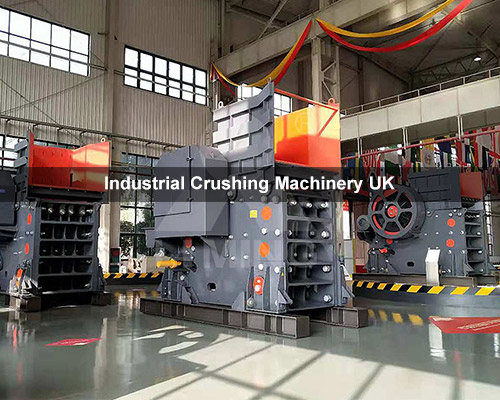Industrial Crushing Machinery UK
Industrial Crushing Machinery UK: The Engine Behind Raw Material Processing
The United Kingdom’s construction, mining, quarrying, and recycling industries rely heavily on powerful industrial crushing machinery to process vast quantities of raw materials. From reducing massive boulders in quarries to pulverizing concrete from demolition sites and shredding waste for recycling, these robust machines are fundamental to infrastructure development, resource recovery, and environmental sustainability. Choosing the right crushing equipment in the UK market is crucial for efficiency, productivity, and cost-effectiveness.

Core Types of Industrial Crushing Machinery in the UK
- Jaw Crusher: The workhorses of primary crushing. Ideal for hard, abrasive materials like granite and basalt. They use compressive force between a fixed and a moving jaw to break down large rocks into smaller, manageable pieces. Essential in quarrying and mining operations across the UK.
- Cone Crusher: Designed for secondary and tertiary crushing stages. They produce a more cubical and uniform product size compared to jaw crusher. Excellent for processing medium to hard rock (e.g., limestone, sandstone) for concrete and asphalt aggregates. Popular in UK aggregate production.
- Impact Crusher (Horizontal Shaft Impactors – HSI & Vertical Shaft Impactors – VSI): Utilize high-speed impact to fracture material. HSI crusher are versatile for primary, secondary, or recycling applications (concrete, asphalt). VSI crusher excel at shaping aggregates, producing high-quality sand, and are key in the UK’s construction sand market. They offer excellent reduction ratios.
- Gyratory Crusher: Typically used in large-scale mining and quarry operations for primary crushing of very hard, abrasive ore. Less common in smaller UK quarries but vital for major mineral extraction sites.
- Mobile Crushing & Screening Plants: Increasingly dominant in the UK market due to flexibility and cost-efficiency. These self-contained units combine a crusher (jaw, cone, or impact) with screens and conveyors on a single tracked or wheeled chassis. Perfect for contract crushing, demolition sites, and projects requiring relocation.
- Industrial Shredders: Specialized for reducing bulky waste materials (wood, metal, plastic, tires, municipal solid waste) into smaller, more manageable fragments for recycling or disposal. Crucial for the UK’s growing waste management and recycling sector.
Key Applications Across UK Industries
- Quarrying & Mining: Primary extraction and processing of aggregates (sand, gravel, crushed rock), limestone, granite, slate, and other minerals. Jaw crusher, cone crusher, and gyratory crusher are fundamental.
- Recycling:
- Construction & Demolition (C&D) Waste: Impact crusher and specialized mobile crusher efficiently crush concrete, bricks, and asphalt for reuse as recycled aggregates (RCA).
- Metal Recycling: Industrial shredders and specialized crusher process scrap metal.
- Waste Wood & Biomass: Powerful shredders prepare wood waste for biomass fuel or panel board production.
- Tyre Recycling: Granulators and shredders reduce end-of-life tyres to crumb rubber.
- Construction & Demolition: On-site crushing of demolition debris reduces landfill costs and transportation needs, providing immediate reusable material. Mobile crusher are indispensable.
- Agriculture: Processing materials like animal feed or biomass.
- Industrial Processes: Reducing various materials for further manufacturing steps.
Factors to Consider When Choosing UK Crushing Machinery
- Material Properties: Hardness, abrasiveness, moisture content, size of feed material, and desired final product size/shape are paramount.
- Capacity Requirements: Throughput needed (tonnes per hour) dictates machine size and power.
- Application: Primary, secondary, tertiary crushing? Quarry rock, concrete recycling, or waste shredding?
- Mobility: Does the project require a fixed plant or the flexibility of a mobile crusher? Mobile plant hire is a significant market in the UK.
- Operating Costs: Consider fuel consumption, wear part replacement costs (liners, blow bars), maintenance requirements, and labour.
- Total Cost of Ownership (TCO): Look beyond the initial purchase price to include running costs, expected lifespan, and residual value.
- Environmental & Noise Regulations: UK sites face strict regulations (e.g., dust suppression, noise limits). Ensure equipment complies (fitted with water sprays, acoustic enclosures).
- Supplier Reputation & Support: Choose established UK suppliers with strong after-sales service, readily available spare parts, and technical expertise. Look for service centres across the UK.
Leading Suppliers of Industrial Crushing Machinery in the UK
The UK market boasts a mix of global OEMs (Original Equipment Manufacturers) and strong local distributors/service providers:
- Global OEMs: Sandvik, Metso Outotec, Terex Finlay, McCloskey International, Kleemann, Powerscreen, Rubble Master.
- UK Distributors & Service Providers: Many companies specialize in sales, hire, servicing, and parts for major brands across the UK. (Examples: Blue Group, Molson Group, DUO Group, EvoQuip distributors).
- Specialist Manufacturers: Companies focusing on shredders (e.g., UNTHA UK) or niche crushing solutions.
- Crusher Hire Companies: Numerous UK-based companies offer extensive fleets of mobile crusher and screens for short or long-term hire.
The Future of Crushing in the UK
Trends shaping the industry include:
- Increased Automation & Connectivity: Remote monitoring, telematics, and automated settings for optimal performance and predictive maintenance.
- Enhanced Fuel Efficiency & Electrification: Development of more fuel-efficient diesel engines and the emergence of hybrid and fully electric mobile crusher to reduce emissions and noise, aligning with UK net-zero goals.
- Focus on Circular Economy: Growing demand for machinery specifically designed for high-quality C&D waste and other material recycling.
- Improved Wear Materials: Longer-lasting liners and blow bars to reduce downtime and operating costs.
Conclusion
Industrial crushing machinery forms the backbone of vital UK sectors, transforming raw materials and waste into valuable resources. Understanding the different types of crusher, their applications, and the factors influencing selection is critical for businesses operating in quarrying, recycling, demolition, and construction. Partnering with reputable UK suppliers who offer reliable equipment, comprehensive support, and innovative solutions is key to maximising productivity, minimising environmental impact, and ensuring long-term operational success. Whether investing in a fixed plant, mobile crusher, or utilizing hire services, the right crushing machinery is an investment in the UK’s industrial future.









